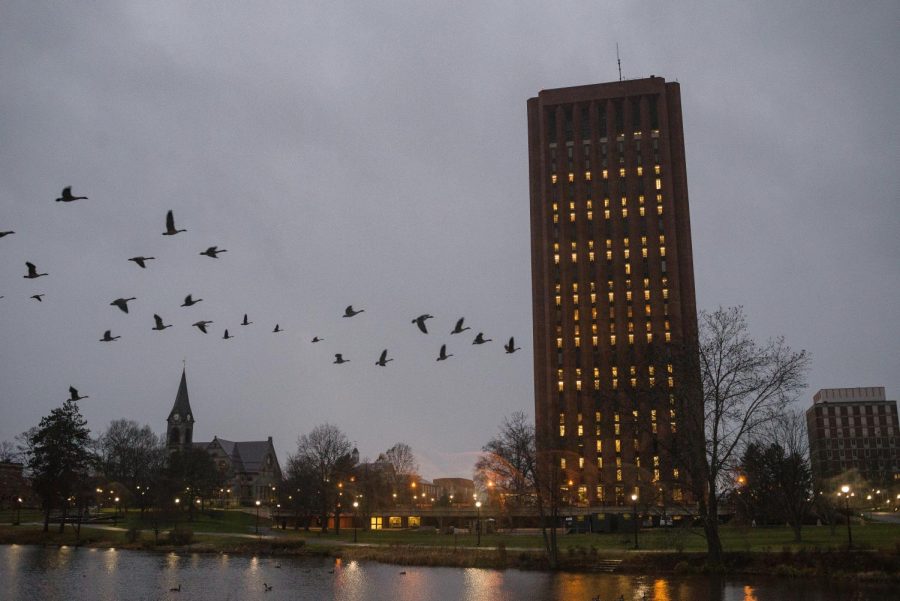On Monday, the 22nd floor of the W.E.B. DuBois library was filled with scholars and students celebrating the namesake’s 152nd birthday, taking part in a larger conversation about racial issues in America.
Attendees sat in chairs surrounding the podium as scholars took turns reading excerpts of DuBois’s works, such as “The African Roots of War.” Despite the plentiful cupcakes and free t-shirts, the event was a solemn reminder of America’s social and racial issues and the relevance of DuBois’s work even after 152 years.
One of the main organizers of the event was Whitney Battle-Baptiste, the director of the W.E.B. DuBois Center at the University of Massachusetts and American historical archaeologist. Battle-Baptiste is of African and Cherokee descent and spoke about how DuBois’ work challenged the societal beliefs of his time.
“I often hear DuBois is ahead of his time,” Battle-Baptiste said. “There’s a lot of things that he writes about that are relevant today, but I think it’s because he thought outside of the borders of the United States. He writes about environmental injustice and us taking care of our planet. He also believed in free health care for all, he talked about perhaps not leaning so much on capitalism because what that would create is basically the rise of the 1 or 2 percent.”
One of the major issues DuBois writes about is racism in America.
“It’s important that we understand, because a lot of what he was talking about was the basis for oppression,” Battle-Baptiste said. “Different groups have very different histories of the ways in which white supremacy has affected them, yet the foundation of it was anti-blackness. There are certain parameters in which black and brown people could not move past for race and segregation.”
For resource economics graduate student Eli Miller, DuBois paved the way for progress.
“He’s really a leader in proto-civil rights,” Miller said. “In terms of today’s context, he, I think, still encourages new thinkers in terms of human equality.”
DuBois’s progressive ideas and his membership in the communist party at the age of 95 has made his legacy controversial to some.
“It was not easy naming the library in 1994 after DuBois – it was controversial,” said Adam Holmes, the program manager of the W.E.B. DuBois center. “DuBois’s legacy even now with some people is tainted by his association with the communist party and by the simple fact that he was an African-American activist.”
Holmes, who comes from a background of social justice and non-profit work, began as program manager in September of 2018 and sees the center as a safe space for interdisciplinary discussion.
“This is a predominately white institution, this is perhaps a conservative institution in many ways, and I feel like we give a venue for people who feel like they aren’t being represented in the wider campus,” said Holmes.
For Battle-Baptiste, DuBois was simply a loyal patriot who aspired to better his country.
“His first love was the United States, the country of his birth,” she said. “His fiction and his poetry were a way for him, in all of his serious academic studies, to express frustrations, hopes and beliefs.”
The event has greatly changed over the years into a more interactive discussion and celebration of his work. In the beginning, the center gave out free cake, but it has now evolved into an opportunity for individuals to share DuBois’s work and connect on a deeper level.
“I really hope that students realize that they should and can take immense pride in the man for whom the library is named,” said Holmes.
Maria Elena Little Endara can be reached at [email protected].





















Ed Cutting, EdD • Feb 25, 2020 at 10:49 am
“For Battle-Baptiste, DuBois was simply a loyal patriot who aspired to better his country.
“His first love was the United States, the country of his birth,”
.
He was a Benedict Arnold — DuBois renounced his US citizenship, in time of war, and went over to the other side.
.
An as to UMass being a conservative university, go count Bernie signs and Trump signs, tell me which you find more of…